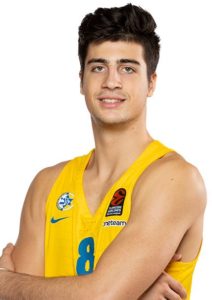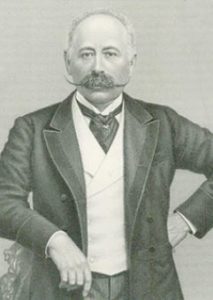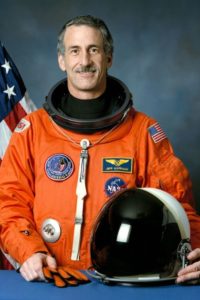The NBA’s Next Big Star?

Deni Avdija
(Credit: Maccabi.co.il)
Deni Avdija (b. 2001) was born in Kibbutz Beit Zera in Israel to a Serbian-Muslim father and an Israeli-Jewish mother. His father was a professional basketball player who had moved to Israel to play for Ramat HaSharon, and then several other clubs. The elder Avdija fell in love with the country and people, and settled in Israel permanently. Deni grew up playing basketball, too, and joined the youth club of Maccabi Tel Aviv when he was 12. At just 16, he signed with Maccabi’s senior team, making him the youngest player ever in the Israeli Basketball Premier League. He went on to win three championships with the team. In the last season, he was the league MVP—setting another record as the youngest player ever to win that prize. He was also the MVP at the European Basketball Without Borders tournament in 2018, and the MVP at the NBA’s Basketball Without Borders Global Camp last year. Avdija earned yet another MVP at the Under-20 FIBA European Championships last year, when he led Israel’s team to the gold. (Though he is eligible to play for Serbia, he has chosen to represent his birth country Israel on the international stage.) After spending a few months with the IDF this past year while basketball was on hold due to COVID, he was drafted by the NBA’s Washington Wizards and signed a rookie contract. He made his NBA debut in a preseason game against the Brooklyn Nets, making a huge splash with 15 points and 2 assists, and going 100% in field goals and threes. The announcer at the game called him the “Mensch off the Bench”, to go along with his other title, “the Israeli sensation”. Some predict he may become the NBA’s next big star. Avdija recently did a public menorah-lighting during Chanukah. He hopes to highlight his proud heritage in the NBA, and to show all “the great things about Israel”.
Words of the Week
When sheep have no leader, they huddle together and imitate each other out of fear. And I’m not talking about sheep.
– Rabbi Aharon Feldman

 Moritz Tzvi von Hirsch auf Gereuth (1831-1896) was born in Munich to a wealthy German-Jewish family. His grandfather was a banker for the Bavarian king, and became the first Jew to be permitted to own land in Bavaria. His father also served as the court banker, and became a German baron. Hirsch studied in Brussels, then took a banking job himself at age 17. Years later, he branched off on his own, eventually making his fortune from sugar, copper, and railroads. One of his boldest projects was building a Vienna-to-Istanbul rail line. Hirsch settled in Paris where he lived for the remainder of his life, going by the French version of his name, Maurice de Hirsch. In 1860, the Alliance Israélite Universelle (Kol Israel Haverim) organization was founded in Paris to secure human rights and education for Jews around the world. Hirsch became their biggest supporter, essentially bankrolling their operation to the tune of several hundred thousand pounds a year. The organization was most famous for building Jewish schools, including the first schools in pre-State Israel. The Alliance schools were also the first to teach a Hebrew curriculum, playing a key role in the language’s revival. Hirsch also donated countless sums to schools and hospitals across Germany, France, and England. He paid for the renowned Pasteur Institute’s entire biochemistry building. In the last two decades of his life, Hirsch was devoted to easing the plight of Russian Jews. He founded the Jewish Colonization Association in 1891 with a starting budget of £2 million pounds. The money was used to resettle Eastern European Jews in the Americas (particularly in Canada and Argentina), as well as in Ottoman Palestine. Altogether, Hirsch donated £18 million to the organization, the equivalent of about $4 billion today! Needless to say, it played a massive role in getting the Zionist movement off the ground and re-establishing a Jewish state in Israel (though de Hirsch himself didn’t believe it would ever actually happen!) as well as saving countless lives from pogroms and oppression. Maurice de Hirsch is ranked among the most generous philanthropists of all time. His wife, Clara de Hirsch, is also on this list, in her own right. She came from a wealthy banking family, too, and donated another 200 million francs of her own funds. When the couple tragically lost their only son in 1887, Maurice de Hirsch declared: “My son I have lost, but not my heir; humanity is my heir.” For his efforts to launch a mass-exodus and liberation of Jews, he has been called the “Moses of the 19th Century”.
Moritz Tzvi von Hirsch auf Gereuth (1831-1896) was born in Munich to a wealthy German-Jewish family. His grandfather was a banker for the Bavarian king, and became the first Jew to be permitted to own land in Bavaria. His father also served as the court banker, and became a German baron. Hirsch studied in Brussels, then took a banking job himself at age 17. Years later, he branched off on his own, eventually making his fortune from sugar, copper, and railroads. One of his boldest projects was building a Vienna-to-Istanbul rail line. Hirsch settled in Paris where he lived for the remainder of his life, going by the French version of his name, Maurice de Hirsch. In 1860, the Alliance Israélite Universelle (Kol Israel Haverim) organization was founded in Paris to secure human rights and education for Jews around the world. Hirsch became their biggest supporter, essentially bankrolling their operation to the tune of several hundred thousand pounds a year. The organization was most famous for building Jewish schools, including the first schools in pre-State Israel. The Alliance schools were also the first to teach a Hebrew curriculum, playing a key role in the language’s revival. Hirsch also donated countless sums to schools and hospitals across Germany, France, and England. He paid for the renowned Pasteur Institute’s entire biochemistry building. In the last two decades of his life, Hirsch was devoted to easing the plight of Russian Jews. He founded the Jewish Colonization Association in 1891 with a starting budget of £2 million pounds. The money was used to resettle Eastern European Jews in the Americas (particularly in Canada and Argentina), as well as in Ottoman Palestine. Altogether, Hirsch donated £18 million to the organization, the equivalent of about $4 billion today! Needless to say, it played a massive role in getting the Zionist movement off the ground and re-establishing a Jewish state in Israel (though de Hirsch himself didn’t believe it would ever actually happen!) as well as saving countless lives from pogroms and oppression. Maurice de Hirsch is ranked among the most generous philanthropists of all time. His wife, Clara de Hirsch, is also on this list, in her own right. She came from a wealthy banking family, too, and donated another 200 million francs of her own funds. When the couple tragically lost their only son in 1887, Maurice de Hirsch declared: “My son I have lost, but not my heir; humanity is my heir.” For his efforts to launch a mass-exodus and liberation of Jews, he has been called the “Moses of the 19th Century”. Jeffrey Alan Hoffman (b. 1944) was born in Brooklyn. He was always fascinated by outer space, and went to study astronomy at Amherst College in Massachusetts. Hoffman went on to get a PhD in astrophysics from Harvard, researching cosmic x-rays and gamma rays. He built one of the first aerial gamma ray telescopes. After this, he did postdoctoral work in the UK, eventually working as a project scientist for the European Space Agency. In 1975, Hoffman returned to the US to work at MIT. His main area of focus was x-ray bursts, and he authored over 20 papers on the subject, becoming the world expert on it. One time, he heard his wife reading a passage in a book saying that there will never be a Jewish astronaut. This inspired Hoffman to pursue just that, and he applied to NASA. In 1978, he was selected for NASA’s astronaut training program, together with
Jeffrey Alan Hoffman (b. 1944) was born in Brooklyn. He was always fascinated by outer space, and went to study astronomy at Amherst College in Massachusetts. Hoffman went on to get a PhD in astrophysics from Harvard, researching cosmic x-rays and gamma rays. He built one of the first aerial gamma ray telescopes. After this, he did postdoctoral work in the UK, eventually working as a project scientist for the European Space Agency. In 1975, Hoffman returned to the US to work at MIT. His main area of focus was x-ray bursts, and he authored over 20 papers on the subject, becoming the world expert on it. One time, he heard his wife reading a passage in a book saying that there will never be a Jewish astronaut. This inspired Hoffman to pursue just that, and he applied to NASA. In 1978, he was selected for NASA’s astronaut training program, together with